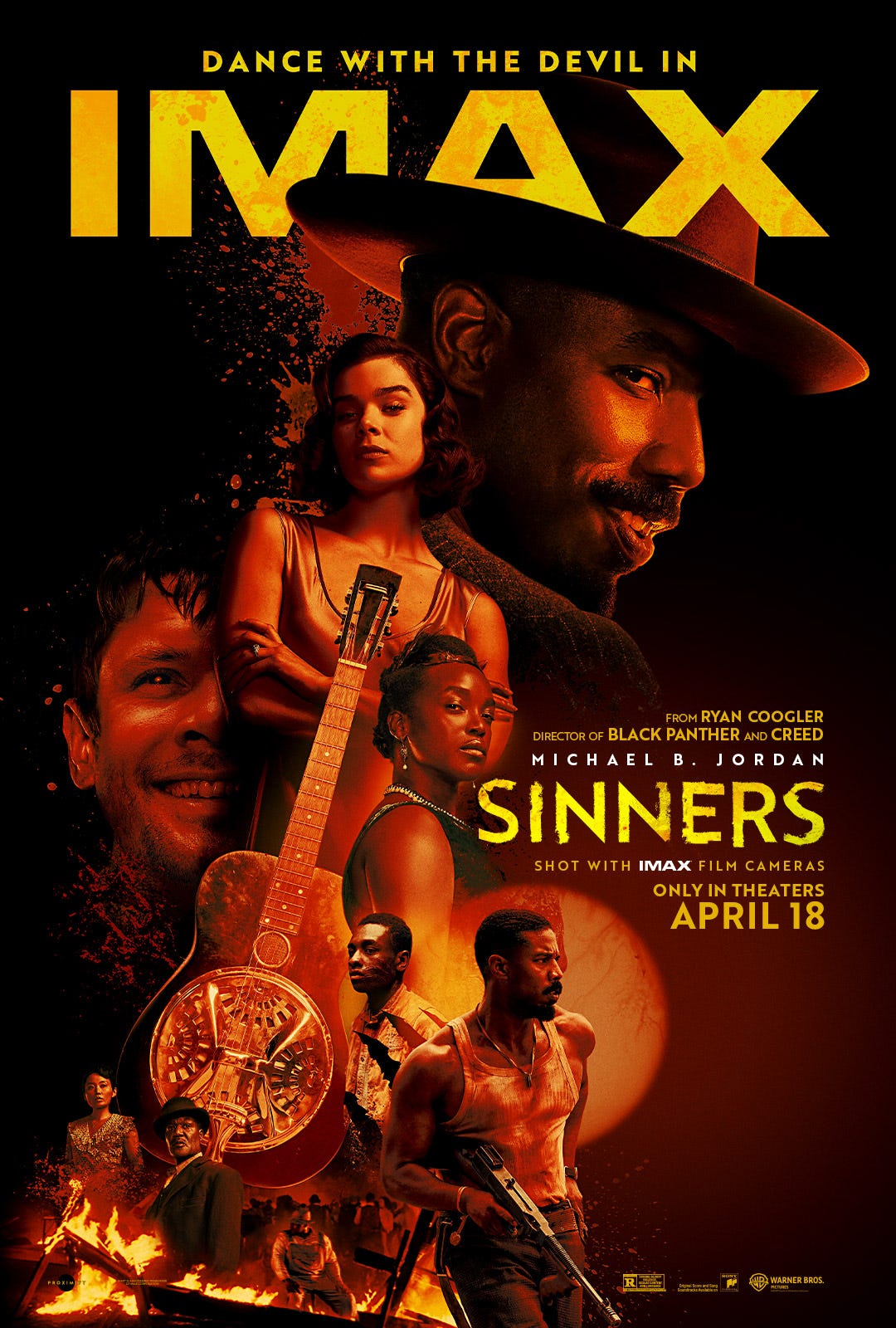Join our Substack Live discussion! Doug Burns (The Iowa Mercury), Nik Heftman (The Seven Times), Dana James (Black Iowa News), and I will be discussing Sinners TODAY, Sunday, May 4th at 11:00 AM CT: https://open.substack.com/live-stream/26465.
The success of Sinners, Ryan Coogler’s latest blockbuster, is undisputed. Just look at a few of the recent headlines:
In Just Five Days, 'Sinners' Has Become One of the Highest-Grossing Horror Movies of All-Time ~Rahul Malhotra, Collider
'Sinners' Breaks Box-Office Records as Highest-Grossing Original Movie Since 2019 ~Richard Fink, MovieWeb.
In Less Than A Week, Sinners Has Made More Money Than Some Of The Most Iconic Horror Films Ever ~Stacey Henley, The Gamer
The timing couldn’t be better. Despite Trump’s (and his administration’s) attempts to dismiss Black excellence, reduce Black people’s accomplishments to mediocrity enabled by unfair DEI handouts, and erase Black history, the truth continues to prevail.
Money talks. (Sinners has grossed nearly $160 million in the U.S., $51 million internationally). Movie goers have spoken. Take that, Donald Trump.
I almost didn’t go see ‘Sinners’
The Warner Bros. movie description was a little vague:
From Ryan Coogler—director of “Black Panther” and “Creed”—and starring Michael B. Jordan comes a new vision of fear: “Sinners.”
Trying to leave their troubled lives behind, twin brothers (Jordan) return to their hometown to start again, only to discover that an even greater evil is waiting to welcome them back.
“You keep dancing with the devil, one day he’s gonna follow you home.”
The trailer portrayed it as a typical vampire movie, but set in the 1930s with Black characters and blues and hoodoo thrown in:
But after catching Lynae Vanee’s reel, I bought my ticket:
[Black] history, history, HISTORY!
Sinners exceeded my expectations. Seeing so many talented Black actors in a film steeped in Blackness in a genre where it’s often absent—and captured on such high-resolution film with evocative cinematography—was overwhelming (in the best way).
But it was the history that hooked me.
Sinners is infused with Black history. Directly, we see the effects of Jim Crow/white supremacy in 1930s rural Mississippi. We see the poverty experienced by Black people, as shown in the humble church in the opening scene, the dirt roads, the rows of cotton that extend to infinity in every direction—which visually depicts the unending poverty faced by Black sharecroppers picking white man’s cotton in exchange for plantation-stamped wooden “coins.” We see shacks like Annie’s, her baby’s grave, adorned with a milk bottle and sticks in place of a headstone, in the yard. We see segregation, White Only and Black Only signs, convict labor, and the violence of the Ku Klux Klan.
But we also see a lot of it symbolically.
We see hoodoo used to heal and protect Black people from realities of white supremacy. We see topics such as freedom, white supremacy, betrayal, and stolen legacy explored through vampires. We see the blues, its roots from the past and its impact today, along with its expression of Black pain and Black joy.
We see all this and so much more.
Black Joy
We also see a lot of Black joy throughout Sinners. In We Refuse: A Forceful History of Black Resistance, author Kellie Carter Jackson defines this nicely:
But Black joy is a collection not of things but of experiences that instill pride, love, and solidarity. The most lasting impact of the Black Power movement was not an increase in the number of Black businesses, Black elected officials, or Black gun clubs, or policy changes affecting Black communities. It was pride. Black pride is a shield against the demoralizing effects of racism.
Jackson goes on to say:
Sometimes Black joy is as simple as seeing yourself reflected in the mirror. Black representation matters and is a constant contributor of joy.
I was filled with Black joy as I watched Sinners.
I’m a member of the Iowa Writers Collaborative. Subscribe to the FREE Sunday Round-up, which also gives you access to The Flipside edition, to get the latest articles from the 70+ writers, journalists, poets, and songwriters that make up the Collaborative. Read and subscribe to the newsletters of the many talented IWC members!






Thanks, I would not have known about this film were it not for you!
A fascinating review that provides thoughtful explanation for the global response to the film.
Note: Coogler and Jordan are brilliant. I loved Creed and Black Panther. But the horror label deterred me. Thank you for providing essential context.